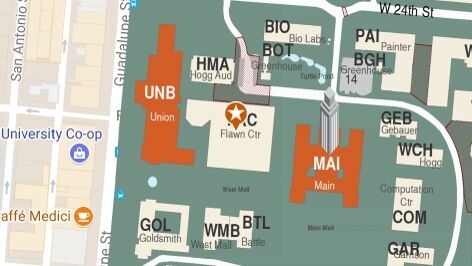Criminal Law, Justice & Inequality
Certificate in the Bridging Disciplines Programs

The Criminal Law, Justice & Inequality BDP allows students to examine the institutions that shape the origins, functions, and effects of the criminal legal system—from policing, to courts, to prisons—in social life.
The Criminal Law, Justice & Inequality BDP helps prepare students to pursue a variety of career paths, whether working directly in parts of the criminal legal system, on policy or advocacy related to the system, or in intersecting fields such as education, social work, or journalism. Through the Connecting Experiences component of the program, students interested in pursuing graduate school or careers related to this topic will benefit from the opportunity to engage in undergraduate research and/or internship experiences related to the criminal legal system.
Eligibility
ShowDegree-seeking undergraduates in good academic standing at The University of Texas at Austin are eligible to apply to the BDPs. Students must be in at least the second semester of their freshman year to be eligible to apply. Students must plan to be enrolled at UT as a degree-seeking undergraduate for at least two semesters after the semester in which they apply to the BDP. The BDPs are open to undergraduate students from every college and school at UT. However, because there is significant overlap in program focus and coursework, some majors and BDP certificates may not be combined. View eligibility information for more details.
How to Apply
ShowApplications for the Bridging Disciplines Programs are accepted twice a year, during the fall and spring semesters. Learn additional information and how to apply to the BDPs. Interested students can attend an information session, which are offered throughout the semester.
Required Courses
ShowWith 19 credit hours of coursework and Connecting Experiences, students may earn a BDP certificate in Criminal Law, Justice & Inequality.
Personality
ShowStudents in the Criminal Law, Justice & Inequality BDP form a community with shared interests in learning about different perspectives on the centrality, legitimacy, and impact of the criminal legal system in the United States in its current form, historically, and comparatively. Criminal Law, Justice & Inequality students come from a wide range of majors at UT, including Government, History, International Relations and Global Studies, Journalism, Psychology, Sociology, and more.
Skills
ShowAfter completing 19 credit hours consisting of coursework, as well as research and/or internship experiences, students earn a certificate that will be recognized on their transcript, demonstrating a secondary area of specialization that complements their major. By pursuing an interdisciplinary certificate, students in the BDPs learn to become more flexible, versatile thinkers, better prepared for a professional world that values innovation and collaboration. Students in the BDPs gain access to unique research and internship experiences at UT and around the world, giving them hands-on experience applying what they have learned in the classroom.
